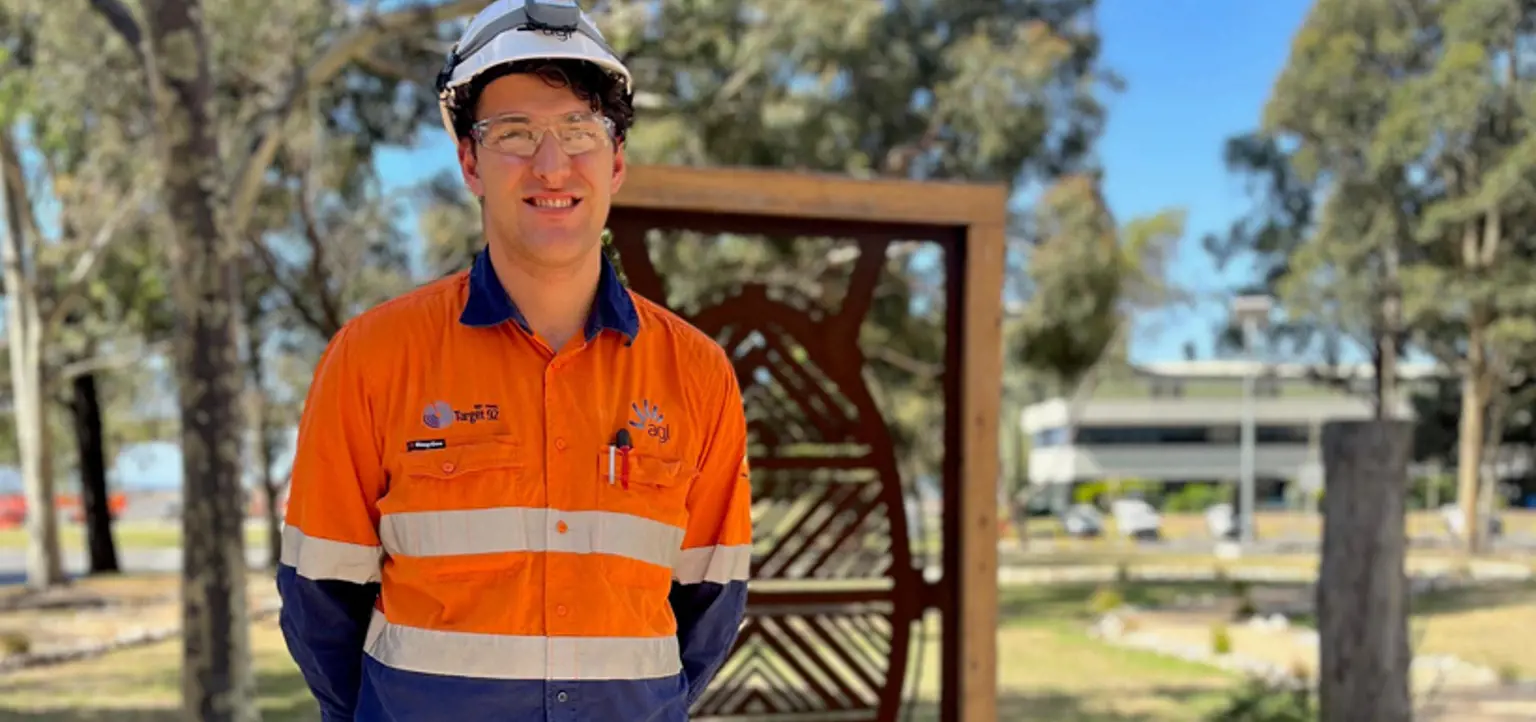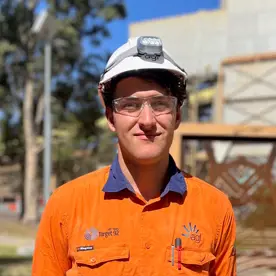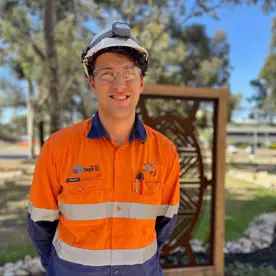Generating opportunities: Federation University’s Co-op model in action

Electrical engineering student Simon Lea found that asking for feedback was one of the best ways to learn from those in the field during his co-op placement.
Real-world experience, real-world impact
At Federation University, we believe the best way to prepare for a career is to start getting your hands dirty as soon as possible and begin working before you graduate.
Our Co-operative Education Model (Co-op) lets you do just that. By bridging the gap between classroom learning and hands-on experience, Co-op ensures our students graduate ready for the world of work.
Through paid placements with industry, our students gain valuable insights, develop essential skills and build networks that set them up for success – all without having to sacrifice earning money to support themselves. It's work-integrated learning taken to the next level.
For Gippsland-based Bachelor of Engineering (Honours) student Simon Lea, Co-op has been a game-changer. Working at the AGL Loy Yang Power Station, he’s had the opportunity to gain real-world experience in electrical engineering and to apply his university knowledge in a professional setting.
Simon’s story, along with insights from his AGL supervisor Darren Hickmott, showcases the power of Co-op placements in shaping future talent.
A student's journey: learning beyond the classroom
Theory in practice
Before stepping into his Co-op placement, Simon had studied electrical components and systems as part of his engineering degree at Federation. While his coursework provided a strong foundation, nothing compares to the hands-on learning he has experienced in his work placement at AGL.
“At Loy Yang, I have been working on instrumentation upgrades, which involve designing solutions to integrate new instruments with the existing plant infrastructure. Additionally, I have been conducting protection testing, where I participate in verifying the functionality of the plant protection systems to ensure they operate as intended.”
This experience has enabled Simon to apply his knowledge in a meaningful way while developing problem-solving skills that cannot be taught in a lecture hall.
Problem-solving in action
Challenges are an inevitable part of engineering, as they are with any job. Co-op students learn to navigate them with confidence.
“During my placement, I’ve had to employ engineering solutions by consulting vendors, suppliers, technical drawings and experts like HV [high voltage] operators and other engineers.”
Simon recalled a situation where he had to replace a drive motor overcurrent relay.
"I initially conducted research and reviewed drawings but still had questions. I reached out to an HV operator, who explained the relay's functionality and role in the system. This clarified the issue and allowed me to proceed confidently."
Additionally, stepping outside his comfort zone was a challenge that he overcame through proactive learning.
“One of the biggest challenges was pushing myself outside of my comfort zone to ask questions and seek opportunities to learn on-site. For instance, I tried to go out into the plant, observe equipment up close and ask experts to explain their functions and roles. This proactive approach has significantly boosted my confidence and understanding of the power station's operations.”
Being immersed in the work environment and having the opportunity to draw on the expertise of workers in the field like Simon did is another one of the benefits of co-op, where students have access to industry knowledge to better understand problems and solve them on the spot.
Taking the lead
Co-op placements offer more than just technical experience; they provide opportunities for students to develop leadership and communication skills.
“I was tasked with conducting risk assessment meetings, where I was responsible for identifying potential risks and facilitating discussions to develop strategies to ensure that the new solution will be safe for both installation and when it has been commissioned.
“This experience allowed me to step into a leadership role and enhance my organisational and communication skills.”
By taking the lead on projects, students like Simon are able to not only contribute to workplace safety but also strengthen their ability to coordinate teams and manage complex projects.
A memorable experience
One moment that stood out for Simon was witnessing the Unit 4 Major Outage.
“Seeing components like 6.6kV motors, generators, turbines and boilers disassembled was fascinating and gave me insights I wouldn’t usually get. It was a great chance to ask questions and deepen my understanding of the plant. This hands-on experience also made it easier to visualise how systems like motors and transformers work, which helped me grasp concepts more effectively and helped with my coursework.”
Co-op works hand-in-hand with students’ learning, with each reinforcing the other. It’s about theory informing practice, and practice reinforcing the theory so that students maintain what they learn.
University support
Throughout his placement journey, Simon felt supported by Federation.
“Federation University supported me throughout the placement process, particularly during the application phase where they helped me polish my resume and cover letter. They also gave me interview skills and practice, which really helped when I did my interview at AGL.
This support is ongoing throughout the process.
“Once uni goes back, I plan on meeting with my placement supervisor and Co-op staff to discuss my placement and how I’ve been going,” Simon said.
Federation is there to help Co-op students all the way, from finding placements to providing feedback as they go, as well as career support after they graduate.

The employer perspective: building future talent
Hands-on learning, industry-ready graduates
For employers, Co-op placements offer a valuable opportunity to shape the next generation of professionals. According to Darren Hickmott, Manager – Electrical and Controls at AGL Loy Yang and Simon's placement supervisor, Simon has played an active role in the engineering team during his paid placement.
"Simon has undertaken electrical engineering duties under the supervision of a qualified engineer. These duties included investigating problems to determine the appropriate solution, developing work scopes to deliver solutions to these problems, preparing drawings for changes and completing some parts of the change management process for his projects.”
Darren was impressed with the leadership Simon demonstrated in coordinating risk management with stakeholders as part of the change management process.
“Simon continues to participate in completing safety checks around the AGL Loy Yang sites,” Darren said.
By immersing students in real-world projects, the Co-op model ensures they graduate with practical experience and a deep understanding of industry requirements that benefits employers.
Shaping the future workforce
One of the standout qualities of Simon was his preparedness for the workplace, including his awareness of safety hazards. Darren noted:
"Simon stood out in the interview process due to his knowledge of electrical hazards like electrocution. His understanding of the ARC flash hazard has been further developed while working at AGL Loy Yang."
This ability to bring knowledge that can then be expanded through involvement with real projects is instrumental in shaping the future workforce.
“Offering industry placements is important for shaping future talent in the electrical engineering field,” Darren said. “Industry placement allows the student to apply theoretical knowledge in real-world scenarios, helping to bridge the gap between academia and industry.
“Simon was introduced to industry standards like the wiring rules AS 3000, which ensures that he develops a strong understanding of compliance and risk management. The experience and knowledge gained around safety awareness is very valuable.”
Exposure to industry standards ensures that students understand compliance and risk management early in their careers, something that would only come later without the Co-op model. It’s just another example of how Co-op provides real-world learning beyond the classroom and prepares them for work in ways that benefit both the student and employer.
For the student and the employer, Co-op is a win-win
Industry placements are a two-way street, providing benefits for both students and employers.
“The student can bring fresh perspectives and innovation to the organisation whilst gaining real-world experience, Darren said. “It provides a talent pipeline for the organisation and networking and career opportunities for the student. Workplace-ready resources are beneficial to both parties.”
By investing in Co-op placements, companies can develop the skills of future employees while gaining valuable contributions from eager and motivated students.

